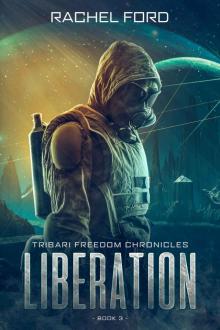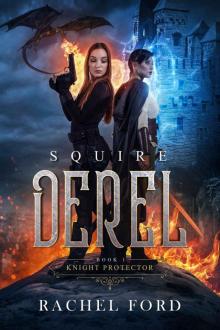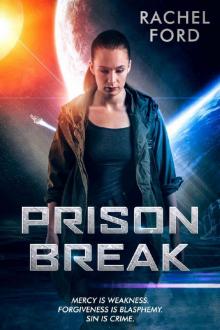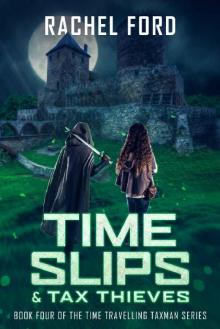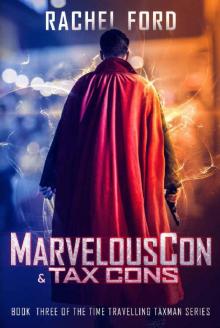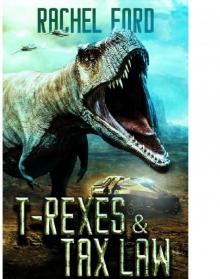Divine revivification a.., p.1
Divine Revivification: A Wholesome LitRPG Adventure (Golden Girl Gamer Book 2), page 1





DIVINE REVIVIFICATION
GOLDEN GIRL GAMER
BOOK TWO
RACHEL FORD
CONTENTS
Summary
Shadow Alley Press Mailing List
Chapter 1
Chapter 2
Chapter 3
Chapter 4
Chapter 5
Chapter 6
Chapter 7
Chapter 8
Chapter 9
Chapter 10
Chapter 11
Chapter 12
Chapter 13
Chapter 14
Chapter 15
Chapter 16
Chapter 17
Chapter 18
Chapter 19
Chapter 20
Chapter 21
Chapter 22
Chapter 23
Chapter 24
Chapter 25
Chapter 26
Chapter 27
Chapter 28
Chapter 29
Chapter 30
Chapter 31
Chapter 32
Chapter 33
Chapter 34
Chapter 35
Chapter 36
Chapter 37
Chapter 38
Chapter 39
Chapter 40
Chapter 41
Chapter 42
More Adventures…
Books and Reviews
Books by Shadow Alley Press
LitRPG on Facebook
Even More LitRPG on Facebook
GameLit and Cultivation on Facebook
About the Author
SUMMARY
The pen may be mightier than the sword, but can a lowly junior scribe really be the key to ending a war among the gods?
Retiree and barbarian fighter Barbara Callaghan is building an alliance capable of defeating Odin, king of the Norse gods. At least, she’s trying to. But as the local populations shy from the cause, and even Loki seems to forget about her, she realizes she’s missing something.
Or, someone.
Army veteran Caleb Dunn, meanwhile, didn’t expect his summer job to turn into a new life, and a quest to save humanity from vengeful gods. And yet, with the shadow of Odin’s wrath looming large in the North, that’s the mission.
Fair enough – except that Caleb was tricked into starting The Old Gods as a junior scribe, a glorified writer and tax collector with no martial skills. Now he’s stuck playing a build that taps into none of his strengths, and all of his weaknesses.
Caleb is the key she’s been missing. Unfortunately, he is a noob. Some rapid leveling is required, and the services of a barbarian brawler, to ensure he survives the process.
With Barbara’s brawn and Caleb’s brains, these two fish out of water just might build an alliance powerful enough to put an end to the chaos.
SHADOW ALLEY PRESS MAILING LIST
Want to keep up with the Golden Girl Gamer Series? Visit Shadow Alley Press and subscribe to our mailing list!
CHAPTER ONE
Albert Vance, owner, developer, and CEO of Symbiote Studios, leaned back in his office chair, fixing Caleb with his sharp gaze. “Well, your application looks great, Mr. Dunn. You’re exactly the kind of candidate we’re looking for in this tester role: a hardcore gamer.
“Someone who has been playing games for decades, and knows what separates the wheat from the chaff. But talking to you, I get the impression that you’re a straight shooter, too. Which is at least as important. I don’t want to be told Symbiote Studios made the best videogame on the market. I want to know why we didn’t, and how we can get there.”
Caleb nodded. “I can definitely do that. Providing detailed feedback was – is – a big part of my role in the videogame study I mentioned on my application.”
“The University of Marshfield one,” Vance said, almost as if to himself. “I remember seeing that. It was something to do with videogames and psychiatry, wasn’t it?”
“That’s right. Treatment of Post-Traumatic Stress Disorder in Combat Veterans.”
“Tell me about it. You’re a veteran yourself, I know. I suppose this was a topic that was close to home?”
Caleb had spent a lot of thought planning his answer to this inevitable question. There were some topics he didn’t like to dwell on, much less in passing, in an interview for a summer job.
But he did need a summer job, and so far, this one sounded interesting.
And the pay was, well, insane.
He went with honesty. “Very close to home. I spent a lot of time playing videogames when I got back.”
“Back from – overseas? A tour of duty, I assume?”
“Yes. Adjustment back to civilian life – it’s a process. The instincts you develop that save your life over there, they have no place here. You need to unlearn them. So you don’t think you’re under fire if someone’s car backfires, or a door slams, or the neighbor shoots off bottle rockets.
“For me, one of the ways I got through it was videogames. I played a lot of combat sims. It was a kind of – exposure therapy, basically. Low stakes, simulated world, but the same situation. Remove the danger, acclimate.”
“Fascinating.” Vance leaned forward, and Caleb thought he really did look fascinated. Intensely so. “You used videogames to treat your own PTSD?”
“It wasn’t a conscious decision at the time,” Caleb admitted. “But in retrospect, yes, it worked out to be basically an informal treatment plan.”
“Amazing. No, really, it is. See, this is what I’m talking about, what I’m looking for. That vision. To your average people, videogames – they’re just entertainment. Cheap, fluffy, glitzy entertainment. Chase your objective, collect your gems, whatever. But that doesn’t scratch the surface, does it?
“Videogames are literature, and art, and cinema all in one. And now, you’re telling me, therapy too.”
“Well,” Caleb cautioned, “we’re trying to demonstrate that, yes.”
“‘We?’ You and your department at the university?”
“Yes.”
“You said your role was to critique the experiment? To make it better?”
Caleb nodded again. “Originally, yes. I am the target demographic, so to speak. I went first, before we started bringing people in. Other people, I mean.”
“Fascinating,” Vance repeated.
Caleb shifted under the intense stare. This was certainly a man who loved his videogames. “Yes, well, I guess so…”
Vance sat back, surveying him. “Mr. Dunn, I think I’d like to offer you a job with Symbiote Studios. Our starting pay is competitive, and we do offer opportunities for advancement and bonuses based on certain performance metrics – something a man of your immense talents would no doubt have little difficulty achieving, if you were interested.”
Caleb was about to inquire further about those metrics when Vance named an hourly sum that momentarily struck him mute. It was on the higher end of the range listed on the job advertisement.
It was more than summer job money. It was real money.
Good money.
When he found his voice again, he put it to use to say, “I’m in.” The details could wait. Even if he never earned a bonus or a promotion, the base pay was better than he’d do anywhere else.
Vance grinned ear to ear and reached across the desk for a handshake. “Excellent. Welcome to the family, Mr. Dunn.”
A rapid tour of the offices followed, with Vance noting that most of their staff were remote. “We have a global team. It’s usually just me at the office. Well, me and Mike.” Then, by way of explanation, he added, “My business partner, Mike Hatcher.”
“Will I meet him today?” Caleb asked.
“What? Oh, no. Not today. Not – soon. He was in an accident. Terrible business, actually. A hit and run.”
“Oh, wow. I’m sorry.”
“He was riding his bicycle, apparently, and someone just drove into him. Left him for dead.”
“I think I may have read about that, actually,” Caleb said. “It was a few weeks back, wasn’t it?”
“Yes. And they still haven’t caught the perp. Which, considering how much we pay in taxes for this police department, is absolutely unacceptable.”
Caleb made a few noncommittal noises of agreement. From what he could recall of the story, the accident had occurred in a quiet residential area. There’d been no witnesses and no material evidence left at the scene.
Not much for police to go on. He wasn’t surprised they hadn’t found anyone yet. But, of course, Mr. Vance wouldn’t see it that way. No one would when it involved a friend or business partner.
They moved on to – or rather, turned around to face – the breakroom. Adjacent to the rest of the open floor plan office, the kitchen area featured a microwave, mini fridge, sink, and table.
“As you can see,” Vance said with a shrug, “it’s a modest space. Not much need for real estate when we’re all over the globe.”
“I’ll be working out of the main office?” Caleb asked.
“Yes, in the beginning. But once you’re acclimated, provided you want to, we’d send the unit home with you. You could test right out of your living room, if you want.”
A twinge of unease flitted through Caleb. High-paying, and remote too? This job was almost too good to be true.
Caleb was here, after all, and not somewhere else.
They finished by turning back to the main office space. And as Vance walked him through the logistics of testing, Caleb understood why they’d want him to be remote.
The VR capsule was right next to the desks, which were right next to the breakroom and lobby area. Cram too many people into this space, and they’d be tripping over each other.
As for the VR capsule, that gave Caleb his second pause for the morning. A swiveling, salon-style seat fixed to the floor, with a host of wires and electrodes nearby.
He’d seen the new, high-end, immersive VR units other companies were rolling out. He’d even got to test a few through his work with the university.
This one looked – well, homemade.
Vance must have noticed the concern in his gaze, because he said, “It was our prototype. The new units, the electrodes are secured in a slick helmet and visor duo. It looks very next gen. Our market research shows it earns high marks on design and visuals. Higher than our competitors, actually.”
He shrugged. “But we keep this one here, partly I guess from nostalgia. ‘Where we come from,’ and all that. And partly because, well, it works.”
Caleb couldn’t fault his logic, and the conversation moved on to paperwork, duties, and schedules.
The role consisted of testing Symbiote Studios’ game, The Old Gods, a fully immersive virtual reality massively multiplayer online game set in a fantasy world based on ancient and medieval cultures. He could decide his play style, and he could form whatever parties he wanted.
“There are individual quests, generated specifically for your character, and shared world quests,” Vance explained. “The decisions you make in your personal quests will impact your options elsewhere. ‘No man is an island,’ as they say.”
Caleb would be responsible for reporting bugs, but also for relaying any general issues he encountered. If a quest felt rushed, or dialogue sounded stilted, or voice acting suffered in a scene, Vance wanted him to file it.
Caleb would be expected to clock eight hours a day, but after his first week, he could set his own schedule. Vance explained that the goal was to bring on enough testers from all over the world so that schedules didn’t really matter – you’d always be able to form a party.
“We’d be looking for you to start as soon as you’re available. And, I mean that literally. If you’ve got the time now, we could get you started today.”
Caleb had no plans for the afternoon, and the more Vance talked about the game, the more excited he was to give it a try.
Half an hour after having his ID photocopied and putting his John Hancock on the dotted line, Caleb was strapped into the VR chair with enough electrodes stuck to his face to pass for an extra in a low budget horror flick.
“You ready?” Vance asked.
“Hit it.”
“Okay. Now, we’ll be communicating the entire time. If something feels off, let me know, and I’ll pull you right out. Okay?”
“Got it.”
“Right. Here we go.”
Caleb glanced up at the hood hovering over his head – the last image he had of the room before the entire facility vanished.
Vance’s voice sounded in his thoughts, as if it came from inside his head. “You should be seeing nothing but black right now. Don’t worry. There’s an initial integration process that takes a few seconds. We’ll have an informatic for the final release, so people know what’s going on.”
“Gotcha.”
Caleb worked to relax his shoulders. He couldn’t see his physical body. He couldn’t see anything but the darkness. It felt like the unit had switched a toggle in his brain and somehow shut off his eyes. But he could still feel the cool vinyl of the chair, the comfortable temp of the room – and the ball of tension between his shoulder blades.
Then it faded too, and Vance said, “Okay, we should be good…now.”
As he spoke, the blackness lifted, replaced by a sparkling title screen of rolling green landscapes and gold letters declaring, The Old Gods. Underneath the title, buttons hovered in his vision, highlighting as he focused on them.
New Character
Load Character
Settings
Exit
Caleb allowed himself a moment to acclimate. His head swam a little, but that was normal. It was supposed to be different for each person entering a VR world. To him, it always felt like a deep, sudden dive into cold, dark water. But then the sensation would pass, and he would experience the generated world as fully as the real one.
It took about five seconds this time before the swimming and dropping sensations vanished. Shorter than some of his previous tests, and longer than a few. All in all, not bad.
“Right,” he said. “I see the title screen.”
“Excellent.”
“Should I proceed?”
“Please do.”
So Caleb focused on New Game, and thought, Go.
“Go?” Vance repeated. “Interesting.”
A character creation screen appeared, featuring a human barbarian model in the usual mold: rippling pecs, bulging biceps, long, scraggly hair, and a loin cloth. Caleb ignored the character, and asked, “What?”
“Oh, nothing. Just, taking notes about how you interact with the system. What commands you use. It’s programmed to accept all kinds of variants, but – well, I’m a data geek. I like to follow the trends and pick up on the outliers. You can ignore me.”
Caleb returned to character creation. The default barbarian boasted strength and combat bonuses, but deficits in intelligence and diplomacy.
He tapped the Race selector. The fair-skinned, meagerly attired human morphed into a gray-skinned gargoyle of roughly the same proportions. Shirtless, like the human, but clad in patchwork trousers and sporting an impressive set of stone wings.
He tried again. The gray skin turned green, the wings disappeared, and the face sprouted tusks. An orc barbarian, then.
Caleb pressed the button again, and the human returned. So he moved to the Class selector instead. There were eleven in total – the Barbarian he’d already seen, as well as Assassin, Bard, Builder, Cleric, Gaian, Mage, Rogue, Scribe, Thief, and Warrior.
As he cycled through them, he realized there were six playable races – but not all classes were open to all races. Humans, Orcs, and Gargoyles could all be Barbarians, but other classes allowed players to choose Goblins, Elves, and Dwarves too. Mage and Rogue were open to all six races, and no race could play all classes.
Humans were the most versatile, with everything but Gaian open to them, and Goblins the least, being confined to Assassin, Gaian, Mage, Rogue, and Thief. Elves could be anything but a Thief or Barbarian.
Caleb was exploring the classes open to Dwarves when Vance interrupted him. “Why don’t we start a play for today, just to get you into the system. It doesn’t really matter which race or class you pick. You’ll end up playing all the combos.”
“Sounds good,” Caleb said. He had cycled through to a dwarven rogue. It seemed like an interesting combination, with strength, stealth, and carrying bonuses. He envisioned a cross between an assassin, a thief, and a pack mule.
He glanced at the Player Name field, thinking Caleb. The text updated from Player 1 to Caleb.
“Actually, I take it back,” Vance said. “We have a lot of players with rogue builds. We haven’t had anyone try a Scribe yet. Do you mind?”












